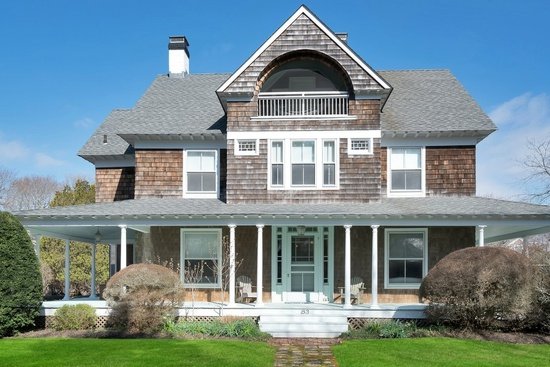
The original owner of an estate in Quogue known as “Slumberside” has anything but a sleepy history. And how appropriate that the property—just listed by Corcoran for $2.85 million—is near the ocean, because that owner had a large impact on the U.S. Navy and international military policies.
Today, the 1-acre parcel at 53 Quaquanantuck Lane contains a nine-bedroom, 4.5-bath, three-story Victorian of just less than 5,000 square feet. The dwelling has a library, studio, study, formal dining room, and all those bedrooms for weekend guests. Too many guests in the house? Direct them to the heated pool or the outdoor screened porch or to the Atlantic, as the owner of Slumberside has beach rights. Easily the most notable feature of the structure is the 14-column wraparound front porch with a privacy wall and hammock hooks once used by the owner … and thus the estate’s name.
It was built in 1894 by Alfred Thayer Mahan, and that is where the Navy comes in. Born in 1840 in West Point, where his father was a professor, Mr. Mahan ultimately became an admiral who the eminent military historian John Keegan declared was “the most important American strategist of the 19th century.” A long life journey led Mr. Mahan to Quogue.
Against his West Point-devoted parents’ wishes, Mr. Mahan attended the U.S. Naval Academy and graduated second in his class. He embarked on a distinguished career, which included serving on Union ships during the Civil War, being stationed in Peru protecting U.S. interests during the War of the Pacific that pitted Peru and Bolivia against Chile, and being promoted to captain in 1885. But it was as a landlubbing writer that Mr. Mahan made his mark. Later that year he was appointed a lecturer at the Naval War College, and he would become president of the college in 1886.
The academic life suited Mr. Mahan well. He researched and wrote several books, the most important one being “The Influence of Sea Power Upon History,” published in 1890. In it, the author maintained that sea power would require the U.S. to acquire defensive bases in the Caribbean and Pacific and to take possession of Hawaii. He also advocated for a major shipbuilding program, which was done when his friend Theodore Roosevelt became president in 1901. Mr. Mahan’s books and views not only influenced U.S. military policy up to World War II, but that of Great Britain, France, Japan and Germany.
Mr. Mahan’s last mission on active duty was to command the new cruiser Chicago on a visit to Europe, where he was hailed as an eminent military philosopher. He retired from the Navy in 1896, two years after the construction of Slumberside in Quogue. There he continued to vacation and write while accumulating honorary degrees from Oxford, Cambridge, Harvard, Yale and Dartmouth. Mr. Mahan died at age 74 in 1914—by then an act of Congress had made him an admiral—soon after World War I began in Europe. Over the years, several ships have been named the USS Mahan.